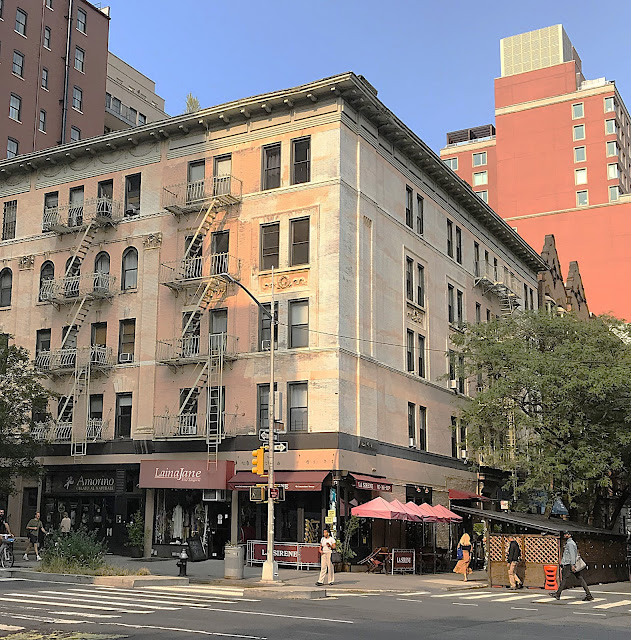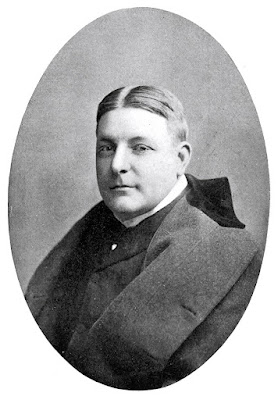Real estate developers Noble & Gauss hired architect Charles See in 1894 to design an ambitious project at the southwest corner of Amsterdam Avenue and West 80th Street--four five-story apartment buildings with stores. Interestingly, the corner building, with its residential entrance at 200 West 80th Street, stood apart from its fraternal siblings. Instead of their arched fourth floor openings and dramatic splayed voussoirs at the second floor, its windows were all square-headed. Only at 200 West 80th Street were decorative spandrels between the third and fourth floors carved with wreaths and ribbons.
Among the initial residents was Civil War veteran General John Hayes, who had served on the staff of General Ulysses S. Grant. He was now, unfortunately, an alcoholic. On August 24, 1897, the New York Press began an article saying, "Age, a need for stimulants to make up the waste of nature, and the loss of comrades were the excuses for drunkenness which a tall, soldierly looking man gave to the police yesterday." The article noted, "He was drunk at Trinity place and Rector street."
The police, who described Hayes as "a man with a brilliant record," would have released him as soon "as sleep would have sobered him" if this had not been his second offense within a week. And so he was incarcerated for the night. When asked to confirm for police court records that he was General John Hayes, he responded, "'John Hayes' was near enough to be correct." The New York Press recounted, "He said that he had reached the stage when he considered stimulants a necessity, and yet had not strength of body to withstand them as he could in the years ago."
The corner store became a James Butler Grocery in 1901, opening on April 6. The first American chain of grocery stores, this newest branch was the 97th James Butler Grocery Company store.
In the meantime, Arnold Daly was perhaps the first resident involved in the entertainment industry. Born on October 4, 1875, he debuted in The Jolly Squire with Fanny Rice in 1892. He opened in the role of Hamilton Travers in Are You a Mason? at Wallack's Theatre on April 1, 1901. But his name appeared in newspapers for other than theatrical reasons when Marie Christie, the maid of actress Fay Templeton, called police after a man "poked his cane through a window."
When arrested, Daly initially gave his name as James Reilly, but his true identity was quickly discerned. The New York Times reported, "He said he had gone to Miss Templeton's house in reference to business, but had not been able to see her." Why he had resorted to breaking a pane of glass was never explained.
Arnold Daly in the role of Eugene Marchbanks in Candida. from The American Stage of To-Day, 1910 (copyright expired)
While living here in 1903, Daly introduced American audiences to playwright George Bernard Shaw with his Candida. It was the first of several Shaw plays in which Daly would appear. With the emergence of silent films, Daly became a matinee idol known to audiences nationwide.
Also living here was actor Jerome Sykes and his wife, Jessie Wood. Born in Washington, D.C. in 1868, the well-rounded entertainer was a singer, comedian and actor. He debuted in Baltimore in The Mikado. The New York Times described him as being "known for his strength and agility as an athlete. Though a large man, he was very graceful and an expert dancer."
While living here, Sykes opened in The Billionaire in 1902. It would be his greatest Broadway success. Sadly, it would also be the cause of his death. After playing a year on Broadway, The Billionaire went on the road in 1903, opening at the Illinois Theatre in Chicago. On Christmas Eve, Sykes hosted a dinner for the cast. The New York Times said he was "thinly clad during an amateur theatrical performance" that night, and he caught pneumonia. The 35-year-old died at the Stratford Hotel in Chicago four days later.
The Billionaire closed following Sykes's death. Ironically, several of the cast members skipped his memorial service on December 30, 1903, going instead to the matinee at the Iroquois Theatre. A horrendous blaze broke out, killing 602 of the 1,700 patrons, two of whom were The Billionaire cast members.
Coloratura prima donna Julia Allen lived at 200 West 80th Street by 1908. She arrived in New York around the turn of the century and became soprano at the Church of the Holy Name of Jesus at Amsterdam Avenue and 96th Street. In June 1903, she debuted in the role of Micaela in Carmen. Five months later, The Sun titled an article, "This New York Girl A Singer," and said the unknown's "voice and her method of singing attracted favorable attention. Miss Allen seemed worth finding out about." The singer traveled to England that summer to study. On November 1, The Sun reported, "She has no idea of returning to her own country until she has made a reputation in all the European countries."
Having done that, she returned to New York and moved into 200 West 80th Street. In 1908 she was a member of the Italian Grand Opera Co.
The building became the scene of what the Daily News called "a bizarre murder mystery" in 1938. The night of January 19 was described by the newspaper as "one of the Winter's coldest nights." Mrs. Amelia Holm, who lived on the fifth floor, heard footsteps on the roof at around 4 a.m., "followed by a rattling of ropes and a crash," said the article. Around the same time, nine-year-old Theresa D'Arcy, whose family lived in the basement apartment, was awakened by cries of help.
The building superintendent, Louis Mielitez, had left the large dumbwaiter on the fifth floor. The following afternoon, at around 4:00, he discovered it was in the basement with its rope off the pulley. The North Shore Daily Journal reported on January 20, "On the roof of the box-like compartment, police found [an] overcoat and suitcoat, neatly folded." There were also a derby hat and another coat, also neatly folded. When the dumbwaiter was raised, the body of 40-year-old Ruland Thompson was discovered. He was described by the North Shore Daily Journal as a "sales executive and member of a wealthy Manhasset family."
The Yale-educated Thompson, who was recently estranged from his wife, was living in the Tudor Hotel. The Daily News said, "To fall into the shaft accidentally would be impossible. Tenants told of hearing the cry of 'Help!' three times at 4 A. M. yesterday. They also heard footsteps on the roof, followed by a crash. But no one investigated, they told police." Despite the wide-spread coverage of the mysterious murder, it does not appear that the case was ever solved.
Born later that same year, Dorothy Pitman Hughes was living here by the third quarter of the century. The indefatigable woman was a feminist, child-welfare advocate, author, entrepreneur, and activist. She organized New York City's first shelter for abused women; co-founded the New York City Agency for Child Development; and with Gloria Steinem founded the Women's Action Alliance. In 1972, she signed the Ms. magazine campaign, "We Have Had Abortions," which demanded an end to "archaic laws" that limited reproductive freedoms.
In her 2000 book Wake Up and Smell The Dollars! Whose Inner City is This Anyway!, Hughes includes several letters addressed to her at 200 West 80th Street from the likes of Hubert Humphrey, Hugh L. Carey, and Charles S. Rangel.
While its storefronts have been brutalized over the decades, 200 West 80th Street retains its architectural integrity after nearly 130 years.
photographs by the author
no permission to reuse the content of this blog has been granted to LaptrinhX.com






No comments:
Post a Comment